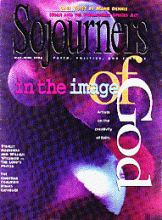Who among us dislikes music? Sure, we all have types of music we don't really care for: opera, punk, rap, rock and roll, top-40 pop, country and western, jazz, or-yuck-show tunes. Yet, nearly from the time of birth, humans have a universal appreciation for some kind of music. Music plays a major role in many areas of our lives we hold dear to our hearts, including our religious celebrations.
Perhaps humanity's innate attraction to music corresponds to the divine music God left vibrating at the core of our beings. (Who taught toddlers to dance anyway?) The music made by humans around the world and throughout the centuries is but an echo of the harmony, order, and tone that God uses to hold the whole universe together. It reverberates throughout all of creation, including our own human bodies, and is expressed in a myriad of different ways.
Music, liturgy, painting, poetry-and even cooking, conversing, and cleaning-in some way reveal the resonance of God deep within us. Pushing through the soil of the Fall, this seed of God's creative grace comes to light as the wonderfully diverse cultures of the human race around the world. Though all of God's creation expresses the divine touch, this creative power is multiplied in the hands (or mouth, feet, and hips!) of those who are made in God's image, who alone are charged to be its stewards, and who are endowed with a unique consciousness of their role.
A Sufi legend from Persia relates that after God created our bodies out of clay, our souls, which naturally love freedom, refused to be imprisoned within such limited confines. So God had the angels play their music, which moved the souls to ecstasy. However, not having bodies, the souls could not hear the music clearly. Nor could they express their joyful response to such a sound. So, in order to hear more clearly and dance more freely, the souls entered the bodies that God had prepared for them, bringing the clay to life.
Read the Full Article
